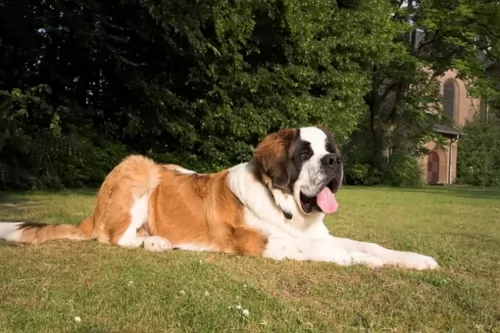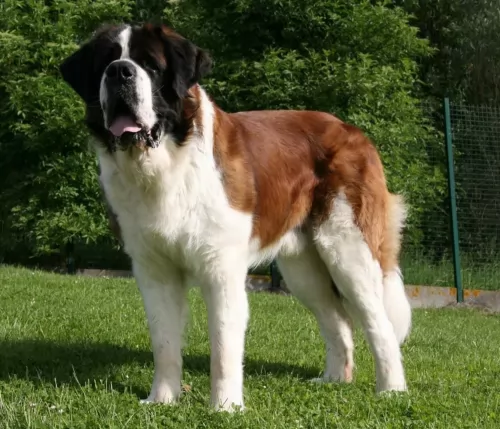 Petzlover
PetzloverSt. Bernard is originated from Switzerland but Toy Bulldog is originated from United Kingdom. St. Bernard may grow 36 cm / 15 inches higher than Toy Bulldog. St. Bernard may weigh 72 kg / 159 pounds more than Toy Bulldog. St. Bernard may live 3 years less than Toy Bulldog. St. Bernard may have more litter size than Toy Bulldog. St. Bernard requires High Maintenance. But Toy Bulldog requires Low Maintenance
 The St Bernard breed was once called the Alpine Cattle Dogs or the Alpine Mountain Dogs. They have always been farm dogs and mountain dogs in the French and Swiss Alps. They come from the border land of Switzerland and France. They were herding dogs, hunting, search and rescue, watchdogs and draft dogs.
The St Bernard breed was once called the Alpine Cattle Dogs or the Alpine Mountain Dogs. They have always been farm dogs and mountain dogs in the French and Swiss Alps. They come from the border land of Switzerland and France. They were herding dogs, hunting, search and rescue, watchdogs and draft dogs.
Their ancestors are considered to include the Sennenhunds and molosser breeds that came to the Alps with the ancient Romans. There are four Sennenhund breeds that are believed to have contributed to the original St. Bernard. These included the Greater Swiss Mountain Dog (Grosser Schweizer Sennenhund), the Appenzeller (Appenzeller Sennenhund), the Bernese Mountain Dog (Berner Sennenhund) and the Entlebucher Mountain Dog (Entlebucher Sennenhund) Today the St. Bernard is considered a Molossoid breed.
The first we know of the St. Bernard in any written records was in 1707 at the Great St. Bernard Pass and Great St. Bernard Hospice run by monks. There were found paintings of the dogs dating back into the late 1600’s. It is told that Barry saved upward of 100 people in the St. Bernard pass, and it is from these stories that the dogs gained their snow rescue reputation.
The St. Bernard of that time did not look like the St. Bernard does today as there was much crossbreeding. Many dogs dies during rescues in the avalanches of the mid 1800’s and so they Saint was crossed with the Newfoundland to preserve the breed. You can today see the resemblance in the build and looks of the two breeds. This cross brought about the long haired St. Bernard whose fur was too heavy for rescues.
The St. Bernards of mountain rescue fame were only about the size of a German Shepherd dog and were short haired. After crossing with the Newfoundland and moving into clubs and dogs shows, they have been bred to be much larger. Before the stud book was closed, it is thought that many larger breeds such as the Greater Swiss Mountain Dog, the English Mastiff, the Tibetan Mastiff, the Rottweiler, the Great Pyrenees, the English Bulldog, the Great Dane, the Bernese Mountain Dog, the Boxer and the Caucasian Oycharka all contributed to today’s St. Bernard.
In 1884 The Swiss St. Bernard Club was founded and the breed entered the Swiss Stud book as its first entry in 1884. It was 1888 when the standard was approved and the breed became the national dog of Switzerland. Before the name St. Bernard came to be common, these dogs might be called, Barry Dogs, Alepnmastiff, Noble Steeds or Saint Dogs.
The dogs came to England in the early 1800s and to the United States soon after. They were recognized by the European kennel clubs first and by the early 1900’s they were the most popular breed in the AKC.
It is believed that the reason for this is that there were different breeding groups working in different directions. One of the groups wanted a smaller dog and there was also an attempt to cross French Bulldogs with Bulldogs to decrease their weight, but this breed was also not developed.
 Today’s St. Bernard is not a large dog, he is a giant dog. Weighing in at 140-200 pounds and standing 28 to 35 inches tall, he is a lot of dog. Bred with mastiffs and large mountain dogs, they have proportional and powerful build. They are strong, sturdy and well muscled. They have either a smooth or rough (short or long) coat. Their eyes are brown or occasionally blue. They have tight lids, and square heads and muzzles.
Today’s St. Bernard is not a large dog, he is a giant dog. Weighing in at 140-200 pounds and standing 28 to 35 inches tall, he is a lot of dog. Bred with mastiffs and large mountain dogs, they have proportional and powerful build. They are strong, sturdy and well muscled. They have either a smooth or rough (short or long) coat. Their eyes are brown or occasionally blue. They have tight lids, and square heads and muzzles.
There are two coat types called smooth and rough, or short and long. The smooth shorter coat is tough, flat and close against the body and the long, rough coat is dense, wavy and heavy around the legs, neck and ruff. Both types have long tails that hang low and are heavy. Saints are known to slobber, drool and snore.
The Toy Bulldog was a medium sized dog standing at between 25 to 35cm in height and weighing between 11 and 18kg.
The coat of the dog was short and smooth and came in colors such as white and fawn, red or brindle. He had quite a bit of soft skin around the face and neck.
He was a small dog with a large body, short legs, broad muzzle, small ears and a docked tail.
The coat was glossy and short and they had soft skin and hair around the neck and head. They come in a variety of different colors ranging from pale yellow, light fawn to solid red.
The Toy Bulldog was a loyal and affectionate dog towards his human family It’s a pity he became extinct because he was amusing and entertaining, a great friend and companion.
They were calm dogs and didn’t require a lot of space and would have adapted well to life in the city or the countryside.
 3.Adaptability no - these are giant dogs that need a lot of room. A large fenced yard or farm is best. They won’t do well in an apartment. They need exercise every day and loping around a yard is very good for them. They love to play in the snow, carry a backpack or pull a cart. They love to have a “job”
3.Adaptability no - these are giant dogs that need a lot of room. A large fenced yard or farm is best. They won’t do well in an apartment. They need exercise every day and loping around a yard is very good for them. They love to play in the snow, carry a backpack or pull a cart. They love to have a “job”
4.Learning ability – They are smart and highly trainable if motivated. They may appear lazy but they are just laid back and need a motivation.
The Toy Bulldog was friendly, docile, calm and gentle although tending to be a little bit stubborn.
He no doubt made a wonderful pet and would have been ideal for single people, families as well as older people. He would have made a splendid pet, and would have been an indoor kind of pet.
Not particularly high in energy, he would have enjoyed some exercise just to ensure he didn’t put on weight. He’s extinct now, but there are other popular bull dog breeds, and something of him lives on in these modern bulldogs.
 The first problem this breed faces is how fast they grow and gain weight. This can lead to serious health issues if not controlled. Their bones can be damaged by this excessively fast rate of growth. Other issues facing the breed include:
The first problem this breed faces is how fast they grow and gain weight. This can lead to serious health issues if not controlled. Their bones can be damaged by this excessively fast rate of growth. Other issues facing the breed include:
It is believed that that these dogs were healthy in their day but were no doubt prone to some canine illness issues just like any other dogs.
They would likely have battled with eye issues such as cherry eye, as well as joint problems.
Cherry eye in dogs may not mean your dog’s life is in danger, but left untreated it can cause bigger eye problems later on.
Unlike a human being, a dog has 3 eyelids, with the 3rd one giving added protection to the dog’s eyes. It’s job is to keep dirt from entering the eyes.
There is a gland in the 3rd eyelid which can move out of place and then it bulges. This is what cherry eye is. The eye becomes irritated and the gland produces discharge. It is best to get your dog to the vet who has the skills and know-how to push the gland back into place.
 1.Feeding the puppy – You want to control their growth. Do not overfeed, and make sure they exercise but not too much. Feed a high quality large breed puppy food 3-4 X a day in small amounts.
1.Feeding the puppy – You want to control their growth. Do not overfeed, and make sure they exercise but not too much. Feed a high quality large breed puppy food 3-4 X a day in small amounts.
2.Feeding the adult – The problem you face with he adult St. Bernard is the potential for Bloat. Don’t over feed. Don’t feed before or after strenuous exercise. Feed 2-3 X a day in smaller amounts to prevent Bloat. Feed a high quality breed specific food if possible or an extra large breed formula.
4. Games and Exercises They need exercise but not as much as you might think. The St. Bernard is a laid back lumbering character so don’t over exercise her. They enjoy weight and cart pulling but they are not athletes who enjoy frisbee or agility. Search and rescue trials and tracking trials are perfect athletic endeavors for them.
The Toy Bulldog would have needed healthy, quality food to remain healthy. It is believed he became extinct in the early 1900s. Maybe there weren't commercially manufactured dog foods then. Their owners possibly tossed them scraps from the table.
Any dog would have to receive a good quota of vitamins and minerals in their food to stay healthy. If the dog was around today, you would read on the packaging label to see what to give him and definitely include some tasty home-made food too.
Nothing spicy and exotic – just plain, boiled chicken, brown rice, sweet potatoes and spinach. Simple foods like this ensure a dog remains free of stomach ailments.
The Toy Bulldog with his short coat would have been easy to groom. He would have required a brush twice a week.
You had to be careful with a dog like this. He didn’t tolerate the heat well. He was not suited for running or jogging and could have developed heat stroke and weakness with his excessive panting. All the huffing and puffing and sweating would have irritated his skin as well.
He would have needed a warm, dry place to sleep indoors. If he went outside, he would have required shade and sunshine to lie in.